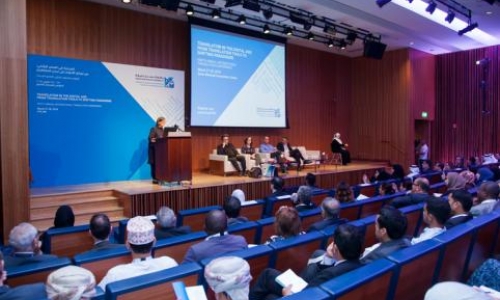HBKU’s TII Invites Submission of Abstracts for Annual International Conference

The Translation and Interpreting Institute (TII) at Hamad Bin Khalifa University’s (HBKU) College of Humanities and Social Sciences (CHSS) is now accepting submissions for its Tenth Annual International Translation Conference. The two-day event is scheduled to take place on March 26 and 27, 2019, and will be hosted at the Qatar National Convention Centre (QNCC). TII welcomes submissions from academics, practitioners and community members who are invested, through theory or practice, in addressing the theme of this year’s conference, which is Translation Beyond the Margins.
Past conference editions have seen participation of hundreds of celebrated local and international experts, speakers and scholars within the translation and interpreting fields. Among notable personalities who gathered in Doha and contributed to a platform for knowledge-sharing as well as the effective exchange of ideas and research, some participants have included novelist Fadia Faqir; Managing Director of AJ+ Dima Khatib; as well as Professor in Translation and Filmmaking at the University of Roehampton Pablo Romero-Fresco. Additionally, Professor Emerita of Translation Studies at the University of Manchester Mona Baker was a recent participant in TII’s conference. The list of speakers in previous conferences also extended to include Professor of Translation and Language at the New Sorbonne University Fayza El Qasem; as well as Executive Director of Digital at Al Jazeera Media Dr. Yaser Bishr.
Dr. Amal Al Malki, founding dean of CHSS, said: “Ten years ago, TII set out to create an international forum of professional exchange and furtherance of the craft of translation and interpreting, positioning itself as an impactful driver of social development towards a knowledge-based society. As such, the magnitude of this year’s 10th annual conference captures the fulfilment of this great aspiration, which is underlined by the increasingly interdisciplinary scope and a selection of highly-distinguished guest speakers.
“The theme for the Tenth Annual International Translation Conference will center on marginalization as a key challenge within the translation and interpreting field. We invite all interested applicants to submit abstracts of their papers exploring these issues in their own unique angles – whether cross-disciplinary or in a broader sense – in order to lay the foundation for pertinent discussions at the conference.”
The thematic areas for the Tenth Annual International Translation Conference include, but are not limited to new territories, new landscapes in translation studies and practices; crossovers in interpreting, audiovisual translation, transcreation, self-translation; convergence and divergence between translation, adaptation and mediation; and translation beyond censorship and taboo. The conference also invites applicants to submit papers exploring translation beyond the margins, tackling rarely addressed industry issues and translation challenges across varying sectors and disciplines. The paper can also touch on topics beyond translation studies’ domain of enquiry (methodologies, epistemologies, and theories), and innovations in research and application, analyzing practices such as collaborative translation, crowdsourcing, and fan-based translation.
Submissions of abstracts should be at least 300 words, in either English or Arabic – which are the official languages of the conference – and must include an introductory statement on the significance of the study, a short description of the basic methodology adopted, a clear indication of the findings of the study, and the thematic area chosen from amongst those suggested for this edition of the annual conference. Submissions must also include the applicant’s institutional affiliation, contact information and a short biography of no more than 100 words. The deadline for submission of papers is October 25, 2018. Selected attendees will have an opportunity to present their papers at the conference in the course of 20 minutes, and respond to questions posed by their peers and the audience over a 10-minute period.
The fields of translation and interpreting are powerful tools when effectively utilized in social or community-based service. Wide-ranging and unconfined, translation is embedded across all fields and extends beyond traditional intellectual and social borders. It often acts as a catalyst for social progression, facilitating knowledge transfer between strategic players, and paving the way for a more inclusive global economy.
Prospective participants interested in submitting a proposal for the 2019 conference may do so online at www.tii.qa/10th.








